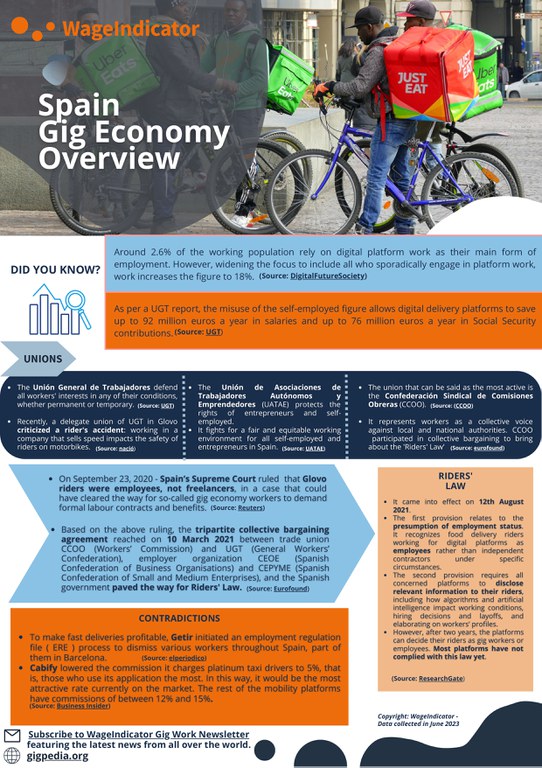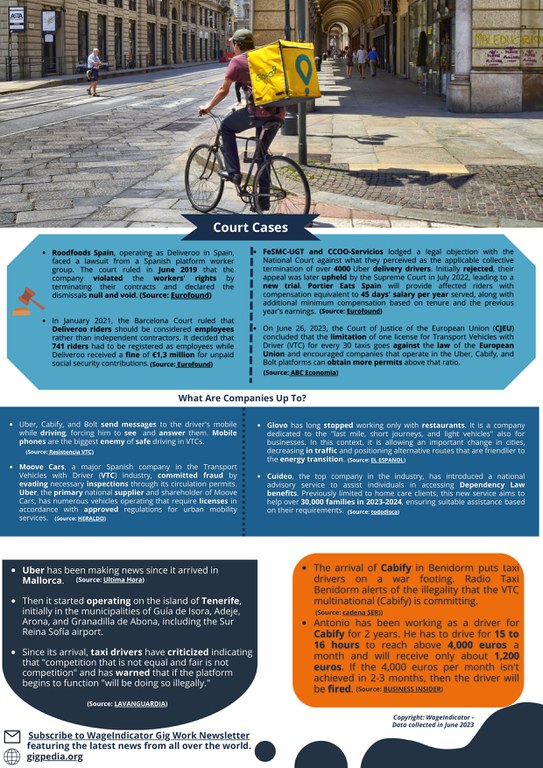Copyright: WageIndicator - Data collected in June 2023
Spain Gig Economy Overview
DID YOU KNOW?
- Around 2.6% of the working population rely on digital platform work as their main form of employment. However, widening the focus to include all who sporadically engage in platform work, work increases the figure to 18%.
- As per a UGT report, the misuse of the self-employed figure allows digital delivery platforms to save up to 92 million euros a year in salaries and up to 76 million euros a year in Social Security contributions.
UNIONS
The Unión General de Trabajadores defend all workers' interests in any of their conditions, whether permanent or temporary.
Recently, a delegate union of UGT in Glovo criticized a rider's accident: working in a company that sells speed impacts the safety of riders on motorbikes.
The Unión de Asociaciones de Trabajadores Autónomos y Emprendedores (UATAE) protects the rights of entrepreneurs and self-employed. It fights for a fair and equitable working environment for all self-employed and entrepreneurs in Spain.
The union that can be said as the most active is the Confederación Sindical de Comisiones Obreras (CCOO). It represents workers as a collective voice against local and national authorities. CCOO participated in collective bargaining to bring about the 'Riders' Law.'
- On September 23, 2020 - Spain’s Supreme Court ruled that Glovo riders were employees, not freelancers, in a case that could have cleared the way for so-called gig economy workers to demand formal labour contracts and benefits.
- Based on the above ruling, the tripartite collective bargaining agreement reached on 10 March 2021 between trade union CCOO (Workers’ Commission) and UGT (General Workers’ Confederation), employer organization CEOE (Spanish Confederation of Business Organisations) and CEPYME (Spanish Confederation of Small and Medium Enterprises), and the Spanish government paved the way for Riders' Law.
RIDERS' LAW
- It came into effect on 12th August 2021.
- The first provision relates to the presumption of employment status. It recognizes food delivery riders working for digital platforms as employees rather than independent contractors under specific circumstances.
- The second provision requires all concerned platforms to disclose relevant information to their riders, including how algorithms and artificial intelligence impact working conditions, hiring decisions and layoffs, and elaborating on workers’ profiles.
However, after two years, the platforms can decide their riders as gig workers or employees. Most platforms have not complied with this law yet.
CONTRADICTIONS
- To make fast deliveries profitable, Getir initiated an employment regulation file ( ERE ) process to dismiss various workers throughout Spain, part of them in Barcelona.
- Cabify lowered the commission it charges platinum taxi drivers to 5%, that is, those who use its application the most. In this way, it would be the most attractive rate currently on the market. The rest of the mobility platforms have commissions of between 12% and 15%.
Court Cases
- Roodfoods Spain, operating as Deliveroo in Spain, faced a lawsuit from a Spanish platform worker group. The court ruled in June 2019 that the company violated the workers' rights by terminating their contracts and declared the dismissals null and void.
- In January 2021, the Barcelona Court ruled that Deliveroo riders should be considered employees rather than independent contractors. It decided that 741 riders had to be registered as employees while Deliveroo received a fine of €1,3 million for unpaid social security contributions.
- FeSMC-UGT and CCOO-Servicios lodged a legal objection with the National Court against what they perceived as the applicable collective termination of over 4000 Uber delivery drivers. Initially rejected, their appeal was later upheld by the Supreme Court in July 2022, leading to a new trial. Portier Eats Spain will provide affected riders with compensation equivalent to 45 days' salary per year served, along with additional minimum compensation based on tenure and the previous year's earnings.
- On June 26, 2023, the Court of Justice of the European Union (CJEU) concluded that the limitation of one license for Transport Vehicles with Driver (VTC) for every 30 taxis goes against the law of the European Union and encouraged companies that operate in the Uber, Cabify, and Bolt platforms can obtain more permits above that ratio.
What Are Companies Up To?
- Uber, Cabify, and Bolt send messages to the driver's mobile while driving, forcing him to see and answer them. Mobile phones are the biggest enemy of safe driving in VTCs.
- Moove Cars, a major Spanish company in the Transport Vehicles with Driver (VTC) industry, committed fraud by evading necessary inspections through its circulation permits. Uber, the primary national supplier and shareholder of Moove Cars, has numerous vehicles operating that require licenses in accordance with approved regulations for urban mobility services.
- Glovo has long stopped working only with restaurants. It is a company dedicated to the "last mile, short journeys, and light vehicles" also for businesses. In this context, it is allowing an important change in cities, decreasing in traffic and positioning alternative routes that are friendlier to the energy transition.
- Cuideo, the top company in the industry, has introduced a national advisory service to assist individuals in accessing Dependency Law benefits. Previously limited to home care clients, this new service aims to help over 30,000 families in 2023-2024, ensuring suitable assistance based on their requirements.
- Uber has been making news since it arrived in Mallorca. Then it started operating on the island of Tenerife, initially in the municipalities of Guía de Isora, Adeje, Arona, and Granadilla de Abona, including the Sur Reina Sofía airport. Since its arrival, taxi drivers have criticized indicating that "competition that is not equal and fair is not competition" and has warned that if the platform begins to function "will be doing so illegally."
- The arrival of Cabify in Benidorm puts taxi drivers on a war footing. Radio Taxi Benidorm alerts of the illegality that the VTC multinational (Cabify) is committing.
- Antonio has been working as a driver for Cabify for 2 years. He has to drive for 15 to 16 hours to reach above 4,000 euros a month and will receive only about 1,200 euros. If the 4,000 euros per month isn't achieved in 2-3 months, then the driver will be fired.


